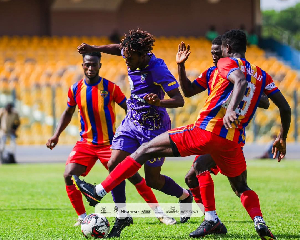Our traditional society was organised in such a clever way that its survival was safeguarded by utilising both the psychological power that society can wield over humans, and the deliberate, physical tutoring of humans, to combat the formidable obstacles thrown across their paths by Nature.
Our sages ensured that right from birth, a person was enveloped within a spiritual world that was indicated through the hearty welcoming of the baby as a former member of the family, once alive, but who had been called back to the “Far Beyond” (in Twi Asamando).
The baby, it was presumed, had been “sent back” to his/her family, in our dimension, perhaps to “complete” the task a worthy ancestor had started on earth but had not finished. So, a child was named after its mother's dead father or mother, or its father's dead mother or father. So long as there had been no blemish on their personal lives while THEY were alive.
Next, suitable names were appropriated from the baby's great-grandparents. After that, the names of ancestors from the larger clan, who had, it must be emphasised, distinguished themselves, during their lifetime, and achieved social prominence. Inspiration, in other words, was "hard-wired" within the art of naming children.
By the way, the same care is taken to name CHIEFS: very few chiefs are allowed to use their own names when they ascend a stool. And no chief would, of course, allow himself to be named after a dead chief who had brought dishonour to his nation, during his reign.
Finally, as a special departure, great friends of the couple who had departed this life, might have their names revived through the new arrival. In this category, anyone from the village or town, to whom recognition was due (say, for engaging in unusual humanitarian activity) might also have their names commemorated as the donor of a name to a new-born baby.
The qualities were looked for in the lives of the departed people after whom it was proposed that a baby should be named were, of course, multifarious. However, personal honesty and integrity; industriousness; wisdom; and physical attractiveness, were among the virtues that came to the fore to work together to get a dead person's name revived by being given to a newborn child.
As the child grew up, its parents and extended family endeavoured to guide him/her towards the qualities of the person he/she was named after. A bad child would often be “called out” by "the full name" given to him/her. This would be a “coded” way of creating resentment by the child's relatives against it.
Those who remembered with respect, the name now been bandied about in protest against bad behaviour, would regard it as a mistake that that particular child was named after their illustrious ancestor. If the child continued its waywardness, it could bring grief, within the society, to its natural parents. Certainly, if hatred and ridicule continued to accompany that child through its life, it would not end up well.
Now, it's is not only names (and the history accompanying them) that a child was made to respect, while growing up. It would also be taught that certain physical objects in the community environment are not to be desecrated. These would include rivers and streams; certain very old trees; and unusual landmarks such as hills, hillocks and valleys, and cemeteries.
Respect for rivers and streams is put above almost everything else, because water was recognised as the SOURCER OF LIFE. NO SETTLEMENT WOULD BE SELECTED FOR HABITATION UNLESS IT WAS ASSSURED OF A PERMANENT SUPPLY OF WATER.
Thus, in the Akan areas of Ghana (and I am certain in some other areas as well) rivers and streams are deliberately given human names so that harming them would constitute a crime as heinous as doing harm to humans..
In my town, Asiakwa, in the Eastern Region, for instance, the two main rivers that existed in my childhood (but both of which have now been tragically killed off by merciless, unscrupulous galamseyers!) the bigger one, Supɔn, was called “Akwasi" [born on Sunday] , while the second, smaller one, Twafoɔ, was called “Yaw” [born on Thursday. It was TABOO to cross thEse streams, on their days of birth, to go and work on farms.
To enshrine its status as our sole means of “water insurance” (that is, in case the bigger Supɔn dried up during a drought) Twafoɔ, small though it was, was expected to possess metaphysical powers that enabled it to “never dry up”! It was expected to stay alive perpetually to give us water to drink! And therefore, it was provided with a special sacred shrine, at which ceremonies were solemnly performed during festivals such as Odwira or Ohum.
This 'fetishization' of the river Twafoɔ, for want of a better term, was the insurrance "premium" that we paid to it! The "premium" was also loaded with its own venerated priestess: a short old lady who led festival processions, dressed all in white, with white clay smeared over parts of her body, declaiming: Ggbooo-gboooo!...Gboooo-gboooo! (in imitation of the roaring of a river. ) She interspersed these onomatopoeic refrain with an unabashed series of explicit self-acclamations:
Gboooo-gbogbooo! Gboooo-gboooo!
Me nono ooo!
Twafo Yaw!
Asuo ketewa a miyiri pɛ berɛ!
(TRANSLATION: That's me, [ROARING!)
Twafo Yaw!
The little river
Who chooses the dry season
In which to flood his banks!)
Flooding its banks in the dry season? It's an unforgettable image, isn't it? The poets who coined that appellation for the river were telling us, in no uncertain terms, that they rated Its abilities to high heaven.
Now, our ancestors expected a child exposed to such ceremonies in its infancy to seamlessly absorb – both at the conscious and sub-conscious levels – the philosophical concepts in such poem-songs as those I've just quoted. And they were right, for, of course, I am reciting it all to you from memory acquired in my childhood, some seventy or more years ago! But, of course, as a human being, the eventual character of a child, no matter what pains were taken to educate it, could never be foretold.
Indeed, even those Ghanaian reprobates who currently engage in destroying our sacred rivers through galamsey; these chameleons who secretly procure excavators and chanfans to turn our rivers upside down, seeking gold from the riverbeds, do realise what taboos they are infringing.
It's not for nothing that they have been fighting to get our government to sanitize their activities, by agreeing to characterise their crime as “small-scale mining.” Naïve as they are -- or perhaps complicit as they are -- some highly-placed officials of our Government acquiesce in this sanitisation effort by those who devastate our rivers and streams and turn our landscape into crater-ridden, moonlike deadlands.
Apropos of this statement, I am glad to report that I watched the pained face of the First Deputy Speaker of the National Assembly, Mr Joe Osei-Owusu, as he asked (in his role as the chair of Parliament's Appointments Committee) of Mr Samuel Abu Jinapor (then prospective Minister of Lands and Natural Resources): “What is 'small-scale' about taking excavators to rivers and digging them up to search for gold”?
'Joe Wise' might well have also queried Mr Jinapor as follows: “How do 'small-scale miners' manage to drive chanfans brought to them from China, past our NUMEROUS POLICE ROADBLOCKS, Into our rivers and forests, to be used for refining gold from sand and pebbles dug up from the riverbeds by excavators?….
Or: “What is small-scale about galamseyers managing to import pump-action shotguns and/or AK47s, to give to their Chinese collaborators, to stand guard against interference from villagers and townspeople, who want to stop their gold-digging in our remote areas? ….
And: “What is 'small-scale' about managing to organise 'Mafia-type' socio-political networks, that are able to ensure that hirelings who arrested with excavators and chanfans are relapsed uncharged, shortly after being arrested? And why do so many arrested excavators get given back to their owners, after being taken to police stations for alleged safe-keeping”?
Mr Jinapor may or may not have realised that the question 'Joe Wise' put to him at his vetting was a rhetorical one. He'd be wise, though, not to regard the opinions he heard at the National Dialogue on Small-scale Mining on 14-15 April 2021, as the idle murmurs of a nation easily swayed with words.
The honest truth, which the Minister will soon discover, is that the Ghanaian people are now sick to death of hearing words that lead to no action. Words against a nefarious practice that everybody “condemns" with their lips – but which continues unabated! And, of course, as he ought to know: ignoring the voice of he people is ignoring "the voice of God"!
Opinions of Sunday, 25 April 2021
Columnist: Cameron Duodu















